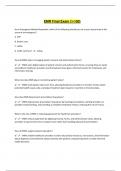EMR Final Exam (1-100)
As an Emergency Medical Responder, which of the following should you set as your top priority at the
scene of an emergency?
A. CPR
B. Patient care
C. safety
D. traffic control ✔️✔️safety
How do EMRs help in managing patient consent and authorization forms?
✔️✔️ EMRs store digital copies of patient consent and authorization forms, ensuring they are easily
accessible to healthcare providers and that patients have given informed consent for treatments and
information sharing.
What role does EMR play in monitoring patient vitals?
✔️✔️ EMRs track patient vitals over time, allowing healthcare providers to monitor trends, detect
potential health issues early, and adjust treatment plans based on real-time or historical data.
How does EMR help prevent prescription drug abuse?
✔️✔️ EMRs help prevent prescription drug abuse by tracking prescriptions, alerting providers to
possible overprescribing, and providing a complete medication history, reducing the risk of misuse.
What is the role of EMR in reducing paperwork for healthcare providers?
✔️✔️ EMRs reduce paperwork by digitizing records, forms, and administrative tasks, allowing
providers to spend more time on patient care rather than handling physical documentation.
How do EMRs support patient education?
✔️✔️ EMRs enable healthcare providers to share educational resources, instructions, and information
about diagnoses and treatment options directly with patients, empowering them to make informed
health decisions.
,How does EMR improve the efficiency of patient discharge processes?
✔️✔️ EMRs streamline the discharge process by ensuring all necessary documentation, prescriptions,
and follow-up care instructions are easily accessible, reducing discharge time and enhancing patient
satisfaction.
How does an EMR aid in monitoring patient compliance with treatment plans?
✔️✔️ EMRs track appointments, prescriptions, and follow-ups, allowing providers to assess patient
compliance and identify those who may need additional support to adhere to their treatment plans.
What is the impact of EMR on patient wait times?
✔️✔️ EMRs help reduce patient wait times by optimizing scheduling, providing quick access to patient
records, and streamlining workflows, which improves overall clinic efficiency and patient satisfaction.
How do EMRs handle patient referrals to specialists?
✔️✔️ EMRs facilitate referrals by allowing providers to share patient data with specialists
electronically, ensuring continuity of care and reducing delays associated with manual referral
processes.
What is patient-centered care, and how does EMR support it?
✔️✔️ Patient-centered care focuses on meeting individual patient needs and preferences. EMRs
support this by providing comprehensive patient data, enabling personalized treatment plans and better
communication between patients and providers.
How does EMR assist in monitoring patient lab values for chronic conditions?
✔️✔️ EMRs track lab values over time, alerting providers to any significant changes that could indicate
disease progression or the need for treatment adjustments, which is essential for managing chronic
conditions.
How do EMRs contribute to preventive screenings?
✔️✔️ EMRs provide alerts for preventive screenings based on patient demographics and medical
history, helping providers ensure patients receive timely screenings for conditions like cancer, diabetes,
and heart disease.
, What is a patient summary, and how does EMR help create it?
✔️✔️ A patient summary is a concise overview of a patient’s medical history, treatments, and current
health status. EMRs generate these summaries automatically, making it easier for providers to get an at-
a-glance view of patient information.
How do EMRs support health coaching programs?
✔️✔️ EMRs enable providers to track and review patient data related to lifestyle and health goals,
allowing them to provide tailored advice, monitor progress, and adjust health coaching strategies
accordingly.
How does EMR improve care transitions between healthcare facilities?
✔️✔️ EMRs allow for seamless transfer of patient data between facilities, ensuring continuity of care
during transitions such as hospital discharges, reducing information loss and promoting better health
outcomes.
What is the role of EMR in managing advance directives?
✔️✔️ EMRs store advance directives, ensuring that a patient's wishes regarding end-of-life care are
accessible to all healthcare providers involved in their care, supporting informed and respectful
decision-making.
How does EMR improve patient-provider communication?
✔️✔️ EMRs facilitate communication by providing patient portals, enabling secure messaging, and
allowing patients to review their own health information, fostering a more open and collaborative care
environment.
What is patient segmentation in EMR, and why is it useful?
✔️✔️ Patient segmentation groups patients by shared characteristics, such as age or chronic condition
status, within EMRs, helping providers target specific patient groups for preventive care and
management.
How do EMRs assist in allergy management?




